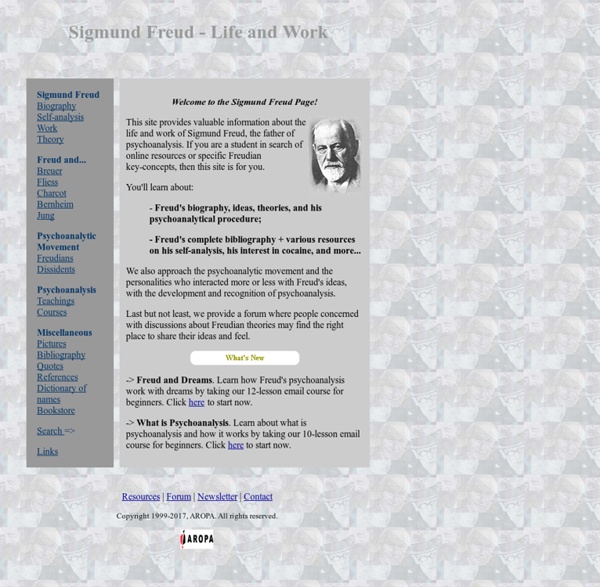



Gerard Keegan's Psychology Site BBC History: The Welfare State - Never Ending Reform Sociology Online UK The Sociology resource for students How Cells Work" At a microscopic level, we are all composed of cells. Look at yourself in a mirror -- what you see is about 10 trillion cells divided into about 200 different types. Our muscles are made of muscle cells, our livers of liver cells, and there are even very specialized types of cells that make the enamel for our teeth or the clear lenses in our eyes! If you want to understand how your body works, you need to understand cells. Anyone who reads the paper or any of the scientific magazines (Scientific American, Discover, Popular Science) is aware that genes are BIG news these days. BiotechnologyGene splicingHuman genomeGenetic engineeringRecombinant DNAGenetic diseasesGene therapyDNA mutationsDNA fingerprinting or DNA profiling Gene science and genetics are rapidly changing the face of medicine, agriculture and even the legal system! In this article, we'll delve down to the molecular level to completely understand how cells work. What is a virus and how does it work at the molecular level?
Office for National Statistics Output in the Construction Industry, November 2015 In November 2015, output in the construction industry was estimated to have decreased by 0.5% compared with October 2015. All new work was the largest contributor to the fall, decreasing by 0.7%, with repair and maintenance (R&M) falling 0.2%. Index of Production, November 2015 Production output increased by 0.9% in November 2015 compared with November 2014. ONS Beta website available The ONS have been developing a new website to replace the current version. UK Trade, November 2015 The UK’s deficit on seasonally adjusted trade in goods and services was £3.2 billion in November 2015. Quarterly National Accounts, Quarter 3 (July to Sept) 2015 UK gross domestic product in volume terms was estimated to have increased by 0.4% in Quarter 3 (July to Sept) 2015; revised from the previously published estimate of 0.5%. Balance of Payments, Quarter 3 (July to Sept) 2015
Doctor Patient Relationship “You are feeling better today,” announced the gastroenterologist as he sat down by my hospital bed. I was genuinely surprised. “Really? What’s better?” “Well,” he sputtered, his face flushing, “in my professional opinion, you are better!” I sighed, searching for more conciliatory words. “Your lymphocytes are better and you look better,” he said after a pause. I smiled, privately wondering how I could look better when my hair was one day dirtier, but I knew I couldn’t afford to challenge him again. Can you hear the tension in this encounter? Tug of War If you’re wondering why so many office visits turn into a tug of war, it’s partly because doctors and patients are on different ends of the rope. To the doctor, illness is a disease process that can be measured and understood through laboratory tests and clinical observations. Doctors feel frustrated, even betrayed, when patients withhold pertinent information. Fault Line All these changes are unsettling for both doctors and patients.